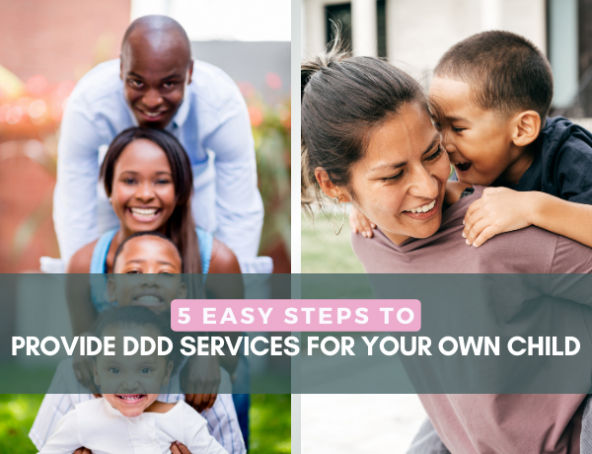5 Easy Steps to Provide DDD Services for Your Own Child

Did you know that parents can now become paid providers for Habilitation and Attendant Care services with their own child? Read this blog to learn how to become a paid Parent Provider.
1. Get Approval from DDD
In order to become a Parent Provider, your child needs to be approved for Habilitation and/or Attendant Care services through DDD (these are the only services Parent Providers are allowed to do). Therefore, the first step is to qualify for the Arizona Long Term Care System (ALTCS), and then enroll with the Division of Developmental Disabilities (DDD).
Each of these steps can be overwhelming and time consuming, but the more prepared you are, the easier it will be. AZA United’s Family Support Team can help you at no cost to prepare for and complete all of these steps successfully, to minimize delays and complications. You can also contact Family Support for help with getting Habilitation or Attendant Care services. The systems of care can be complex so this blog can help you navigate it.
2. Choose a Provider Organization
A provider organization is an agency (or company) that contracts with DDD to provide Habilitation, Attendant Care and other services. So once you are approved for DDD services, you’ll want to choose an organization for you to be set up as a paid provider for your own child. If you have other providers working with your child doing these same services, you can use the same agency or a different one.
Since most agencies offer similar pay rates for parents, you will want to look for a supportive agency that is easy to work with and offers whatever resources you feel are best for your child. What do we mean by “supportive agency”? It’s an agency that will likely provide in-home support, training opportunities, guidance, resources, and other services. Being well-organized, easy to communicate with, helpful when you have an issue, and professional in all interactions are key. But perhaps most important is that you feel like the agency prioritizes high quality services and family support above all else. Pro tip: looking at how long the agency has been around can be a good indicator of experience and competence, as well as asking other parents what they recommend.
3. Complete onboarding requirements:
Now that you have DDD approval and have chosen a provider organization, the third step is all about onboarding, and most of these items are required by DDD or other regulatory agencies. The list may seem long but a supportive agency will walk you through this process. The amount of time it takes to become a Parent Provider is very much up to you and how fast you complete these required trainings and onboarding steps. If you can make time now to get these requirements done, it can happen very quickly.
The onboarding typically begins with an application, followed by submitting identification documents and signing required forms either in person or virtually. DDD also requires that you have current certifications in CPR, First Aid and Article 9. Each of these classes are a few hours long and need to be scheduled separately. There may be a fee, or the agency may offer some or all of the classes for free. These trainings typically need to be repeated every 2 or 3 years. DDD also requires that you have a valid Fingerprint Clearance Card. The agency should give you instructions on where to go to have your fingerprints taken, as well as any associated fees. The card is typically valid for several years.
Further, if you choose to do Attendant Care, you must take an additional class called Direct Care Worker (DCW) Training. However, you have up to 90 days after you begin services to complete this training. The provider agency should provide instructions on how and when to complete this training. There may be a fee, or the agency may be able to offer it for free.
4. Establish Daily Routines & Activities:
As you go through the onboarding process, you will figure out what your schedule will be for providing services with your child. Some things to consider are other services your child is getting, other providers coming into your home, school hours, their needs, and when do they need the most support (time of day, when is child struggling, etc.). Some agencies (like AZA) have field support staff will help you establish routines and plan activities to work on Habilitation goals. Remember, as a parent provider you are also a client, so take advantage of whatever supports the agency can offer.
If there are two parents that will be providing services (either in the same home or separate residences), communicate with the provider agency to make sure you are aware of any policies or requirements to ensure this is possible.
5. Report Your Time and Session Data
You are finally at the point where, once you have completed all the onboarding requirements and your agency has received the Habilitation or Attendant Care authorization from your DDD Support Coordinator, you should be notified that you can begin providing services for your child!
All provider agencies are now required to use Electronic Visit Verification (EVV) software for tracking service time. You should receive instructions from the agency on how to use their online system, which involves clocking in & out on your smartphone. You will also be required to record data and notes in the EVV system for each shift.
Most parents, sometimes with some extra support from their agency, find this a pretty straightforward exercise. Session data includes your child’s experience working on their goals. Your agency’s support team will view the data and then share it with DDD. Every 90 days, which is called a “90-day marker,” your DDD Support Coordinator will review progress and goals to assess if there are any adjustments to the plan that should be made.
What are the next steps?
If your child is eligible for Habilitation or Attendant Care services and you’d like to get signed up as a Parent Provider, click on the appropriate link below to get started:
Parent Provider Application for central & northern Arizona families
Parent Provider Application for southern Arizona families
For more detailed information, review this handout:
Parent Provider FAQs
AZA United's Family Support Team provides support and guidance for families facing any number of challenges as they navigate the Autism journey. This service is available at no charge to all members of the autism and developmental disability community. You may make a phone appointment that works with your schedule by visiting azaunited.org/supportcall
You May Also Be Interested In:


For more helpful resources and information, follow AZA United on social media:





